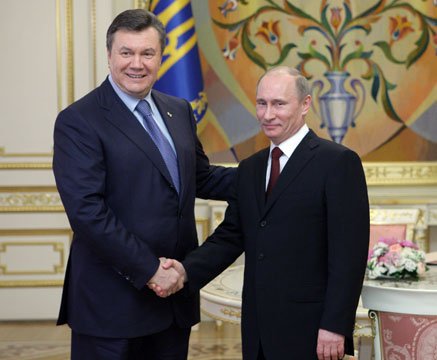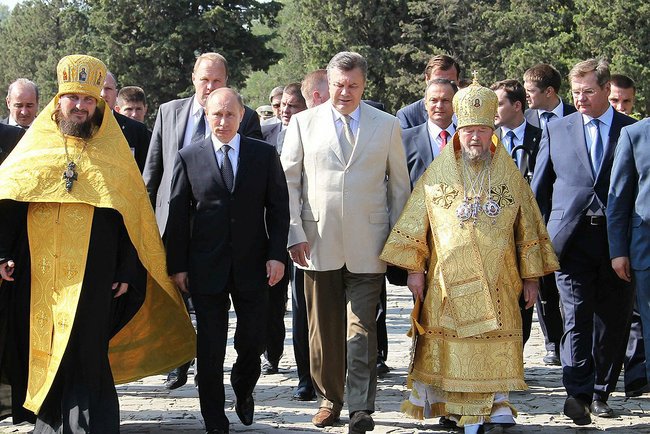Free Cheese Can Only Be Found in a Mousetrap Russian
After their president Viktor Yanukovych's talks with Vladimir Putin, Ukrainians are roughly divided into three camps: the first camp believes that Yanukovych has sold his country down the river in return for cheap gas and credit; the second that Russia has been made to pay for Ukraine's U-turn on integration with Europe; and the third that Yanukovych has saved his country. But all three are united on one thing – that Kyiv is even more dependent on Moscow than ever before.
The talks, which took place on 17th December, lasted a mere hour and a half, but concluded with the signing of an impressive pile of documents. The presidents of Russia and Ukraine agreed on, 'a further liberalisation of trade regulation' within the Commonwealth of Independent States (CIS, the loose association of former Soviet republics), and on the production and signing 'as soon as possible' of a document on 'the convergence of technical specifications in Ukraine and the Eurasian Customs Union.' Russia also agreed to finance the completion of the third and fourth reactors at the Khmelnytskyi nuclear power plant in western Ukraine, and renewed production of the massive AN-124 Ruslan air freighter. The two countries also agreed on closer cooperation to combat the drugs trade.
Ukrainians are roughly divided into three camps. But all are united on one thing – that Kyiv is even more dependent on Moscow than ever before.
Before the meeting, no one had thought about such a close rapprochement, although there were suspicions. Even before Yanukovych left for Moscow, Ukraine's opposition was saying that he was fully prepared to ditch his country and join the Eurasian Customs Union, which at present consists of Russia, Belarus and Kazakhstan, and may soon also include Armenia. No such formal agreement was signed in Moscow, but Ukraine has effectively become a member, in return for concessionary gas prices and $15 billion worth of credit in the shape of Ukrainian government bonds that Putin has promised to buy.
'The only place you find free cheese is a mousetrap,' says Arseny Yatseniuk, leader of the opposition Fatherland party, 'Russia would never give $20 billion away just like that. It's possible that President Yanukovych agreed to join the Customs Union just before the 2015 presidential election.'

On 17 December, against the backdrop of mass pro-EU protests, President Yanukovych met with Vladimir Putin. Their controversial talks lasted a mere hour and a half but concluded with the signing of a number of documents.
Dire straits
It must be said that these agreements have come at a difficult time for Ukraine, whose economy is in a very bad way. Tax revenues are down, salaries are being paid irregularly, and a growing number of firms are closing. 'Let's imagine what would have happened if the talks hadn't taken place,' argued Prime Minister Mykola Azarov at a cabinet meeting on 18 December, 'if we hadn't taken the difficult but necessary decision a month ago to freeze the process of signing an Association Agreement with the EU, we would now have needed a bailout from the IMF. It would have made impossible demands: a doubling of housing and utilities charges; a serious devaluation of our currency; swingeing government spending cuts; an end to subsidies for our farmers, and a freeze on salaries, pensions and benefits, if not their complete abolition in some cases; and then what would have been in store for Ukraine? I'll tell you: bankruptcy and social collapse. That's what Ukraine's New Year present would have been!'
Some experts are suggesting that the president may have offered to hand over some Ukrainian territory.
Azarov, of course, failed to mention that the responsibility for this 'bankruptcy and social collapse' would have lain entirely with his government, and not the IMF, which was merely suggesting ways of avoiding this fate.
Now many Ukrainians are asking themselves what Yanukovych offered Putin in return for his largesse. There is plenty of conjecture, but no hard facts. Some bold experts are even suggesting that the president may have offered to hand over some Ukrainian territory. In confirmation they refer to one of the clauses in the final protocol of the presidential discussions in Moscow, which states that: 'both governments should, in the first quarter of 2014, table a motion on the proposals agreed for increased participation of the Russian Federation in the social and economic development of the city of Sebastopol and other towns and cities on Ukrainian soil where units of the Russian Federation's Black Sea Fleet are stationed.'
Ukraine's former Foreign Minister Volodymyr Ohryzko is one of those who believe that Ukraine has surrendered part of its political and economic sovereignty: 'Putin's speech contained a very serious statement. It sounded very soothing - "Russia expects Ukraine to consult with it on matters of external policy" – but as we know, he who pays the piper, calls the tune.'
Other sceptics claim that it will be a question of Russian businessmen gradually acquiring stakes in Ukrainian engineering, aeronautics and nuclear power plants, with an option to buy them outright or privatise them at some future date. 'When Yanukovych guaranteed Ukraine's part of the agreement he effectively pawned our agricultural sector, aviation and shipbuilding industries and so on,' says Oleh Tyahnybok, leader of the 'Freedom' party, 'and now he wants to bridge the gaps in next quarter's spending with this money from Moscow.'
With strings attached
No one is in any doubt that Ukraine's rapprochement with Russia, and its U-turn on the EU are connected, and that the billions of dollars of credit are its reward for rejecting integration with Europe. As Viktoria Syumar, a journalist and former head of the Institute of Mass Information, a Kiev-based NGO that promotes quality journalism and educates media consumers, laments: 'When I consider what Yanukovych gave away in return for cheap gas and $15 billion of credit, I can't avoid the thought that he gave away something that means nothing to him – Ukraine's European future.'
'Given our special relationship with Ukraine, and wishing to continue our close cooperation, it is also in our interests to provide it with support.' Vladimir Putin
The people involved in the talks, on the other hand, refuse point blank to discuss their agreement in these terms. 'It's got nothing to do with either the Maidan protest or Ukraine's negotiations with the EU', declared Vladimir Putin at a press conference. 'We just see that Ukraine is in a difficult situation and needs support. Given our special relationship with Ukraine, and wishing to continue our close cooperation, it is also in our interests to provide that support.

Ukranians are deeply divided on Yanukovych's talks with Putin but everyone is in agreement over one thing: Kyiv is now more dependent upon Moscow than ever before.
'Ukrainian government figures see the Russian financial support as the salvation of their national economy. Russian investment will allow Ukrainian industry to become profitable, which in turn will increase tax revenue and get people back into work. Living standards, they say, are also expected to rise: on the day after the Moscow talks the Ukrainian government held an emergency debate to approve its draft budget for 2014. This included an increase in the cost of living and the minimum wage, which is planned to rise from 1 January by 29 Hryvna to 1176 Hryvna a month (£87) and by another 80 Hryvna in October to 1256 Hryvna (£93).
Even the ruling Party of Regions (whose honorary leader is Viktor Yanukovych) recognises that the Russian money will give them a boost in the presidential election, for which campaigning will start next year. According to MP Volodymyr Makeenko: 'We have the basic figures – the price of gas, the US Dollar/Hryvna exchange rate [approximately 8:1]. And we'll keep an eye on that and decide whether to run to the bureaux de change or not. Our budget plans include an increase in social expenditure, so we're sitting pretty for both the New Year and the election campaign.
'We mustn't, however, forget that all the government's hopes could disappear overnight. The concessions gained by Ukraine are a question not just of aid, but also dependency. Russia, after all, has said nothing about the new gas price being permanent – it will be reassessed each quarter; and the credit is not a lump sum, but a gradual injection of cash in the form of the purchase of Ukrainian government bonds. Moreover, if Kyiv doesn't toe the line, the gas price might well return to its old level, and the bonds might not be bought. Money talks, as they say.
Free Cheese Can Only Be Found in a Mousetrap Russian
Source: https://www.opendemocracy.net/en/odr/in-ukraine-free-cheese-is-mousetrap-0/